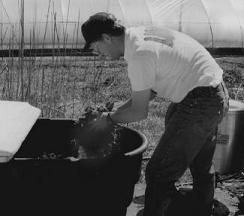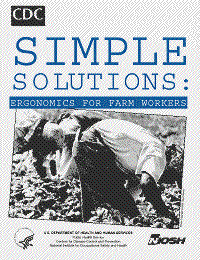|
Mesh Bags: Easy Batch Processing:
| Problem: |
One Solution: |
Washing leafy greens by hand is backbreaking
and time-consuming. |
Use mesh bags to speed the process. |
 |
 |
| Worker must stoop, lift, and grip repeatedly. |
Erect posture while removing and draining
leaves. |
| Slow washing reduces crop quality. |
Greater amount per trip: can use batch processing. |
There is static load on arms while holding
produce to drain. |
Able to wash 50% more greens (by weight)
in the same amount of time. |
Hands are in direct, frequent contact with
cold water. |
Faster process maintains crop quality. |
| Rough handling lowers crop quality. |
Hands spend less time immersed in cold
water. |
| |
Less chance of leaf damage from crushing. |
Mesh Bags
When Would I Use a Mesh Bag?
A mesh bag is a woven or knotted polyester or
nylon sack that lines your harvest containers or
wash basins. When you need to wash a large
number of small items (such as salad greens,
peas, beans), a mesh bag can save you time and
help reduce stress and strain on your body.
What Is 'Batch Processing'?
You can move a large amount of produce at one
time through the harvest, washing, and drying
process. This amount, or batch, allows you to
speed the entire process because you cut out
many short repetitions along the way. For example,
you can line your harvest container with a
mesh bag, then lift the entire bag and its contents
into the wash basin. Leave the produce in the
bag to soak and rinse, and then lift the entire
batch to dry. Dry light produce by placing the bag
into a commercial salad spinner, or use an old
washing machine set to "spin" cycle. The mesh
allows water to drain out. If you don't have a spinner
or washing machine to dry produce, spin the
bag lasso-style in the air.
Will Using Mesh Bags
Save Me Money?
Mesh bags cost approximately $2-$5 apiece, and
the time savings from batch processing with a
mesh bag will increase your profit. You can lift
50% more produce by weight with a mesh bag
compared to by hand without a bag. Indirect savings
will occur from preventing stress and strain
on your body. Produce quality is improved with
faster washing and drying, and produce loss from
repeated handling is also prevented.
Where Can I Get Mesh Bags?
Several companies sell mesh bags for various
uses such as laundry bags and storage bags.
Check ads in magazines such as the American
Vegetable Grower, Growing for Market, and The
Packer. The Nylon Net Company sells a 22"x22"
square bag with 1/4" mesh. Cady Industries sells
32"x27" knotted McKnit bags. These sources are
provided as a convenience for our readers. They
are not an endorsement by the University of
Wisconsin-Extension, nor is the list exhaustive.
Cady Industries
P.O. Box 2087
Memphis, TN 38101
800-622-3695
Nylon Net Co.
845 North Main St.
Memphis, TN 38107
800-238-7529
Contact Information
This material was developed by the Healthy
Farmers, Healthy Profits Project, whose goal is to
find and share work efficiency tips that maintain
farmers' health and safety and also increase profits.
For more information, visit our web site at
http://bse.wisc.edu/hfhp/ or call 608-265-9451.
Healthy Farmers, Healthy Profits Project,
Department of Biological Systems Engineering,
College of Agricultural and Life Sciences,
University of Wisconsin, 460 Henry Hall,
Madison, WI 53706.
Feel free to reproduce; please
mention source.
|


